The effects of using mock conferences to teach interpretation skills to the 4th year cadets of the English department at military science academy
Mock conference has been documented as an effective way to prepare interpreters for future
professional careers in many institutions. In Vietnam; however, its effectiveness remains
inconclusive as research on this activity has been rarely reported. Hence, this study presents
the findings of effects of applying this activity to teaching interpretation skills to the fourthyear cadets of the English Department at Military Science Academy. An action research was
conducted in one intact group at Military Science Academy via deploying three main instruments.
Similarly, the effect of using the model was measured by statistical data. Thus, the effect of the
mock conference on the cadets’ performance could be triple-checked. The findings revealed that
the new activity did improve cadets’ interpretation skills as it brought about seven key benefits.
Hence, it can be concluded that this activity may be a feasible solution to improving the quality
of teaching interpretation skills to the fourth year cadets at Military Science Academy so that they
can lay a good foundation for their future career as interpreters.
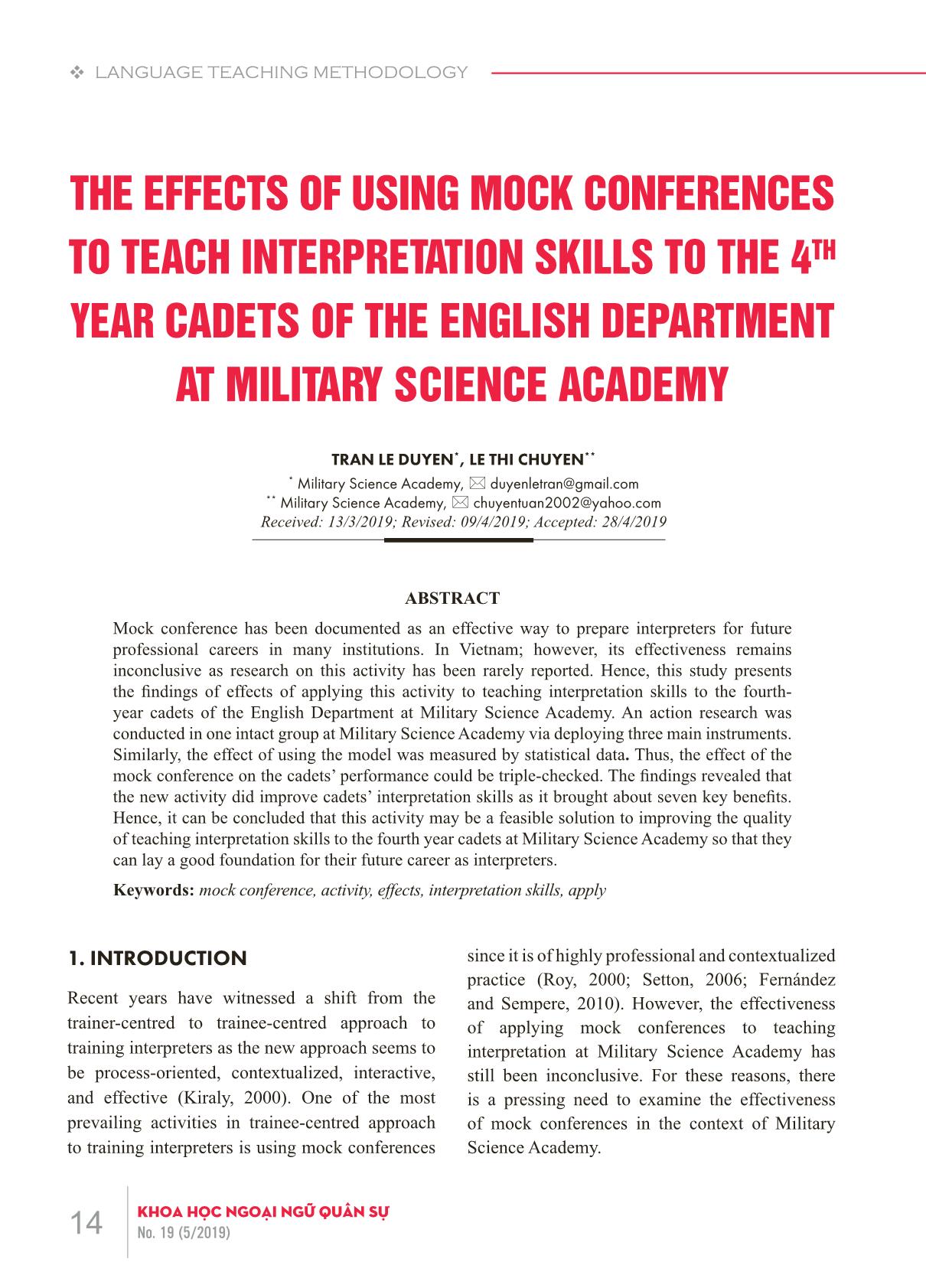
Trang 1
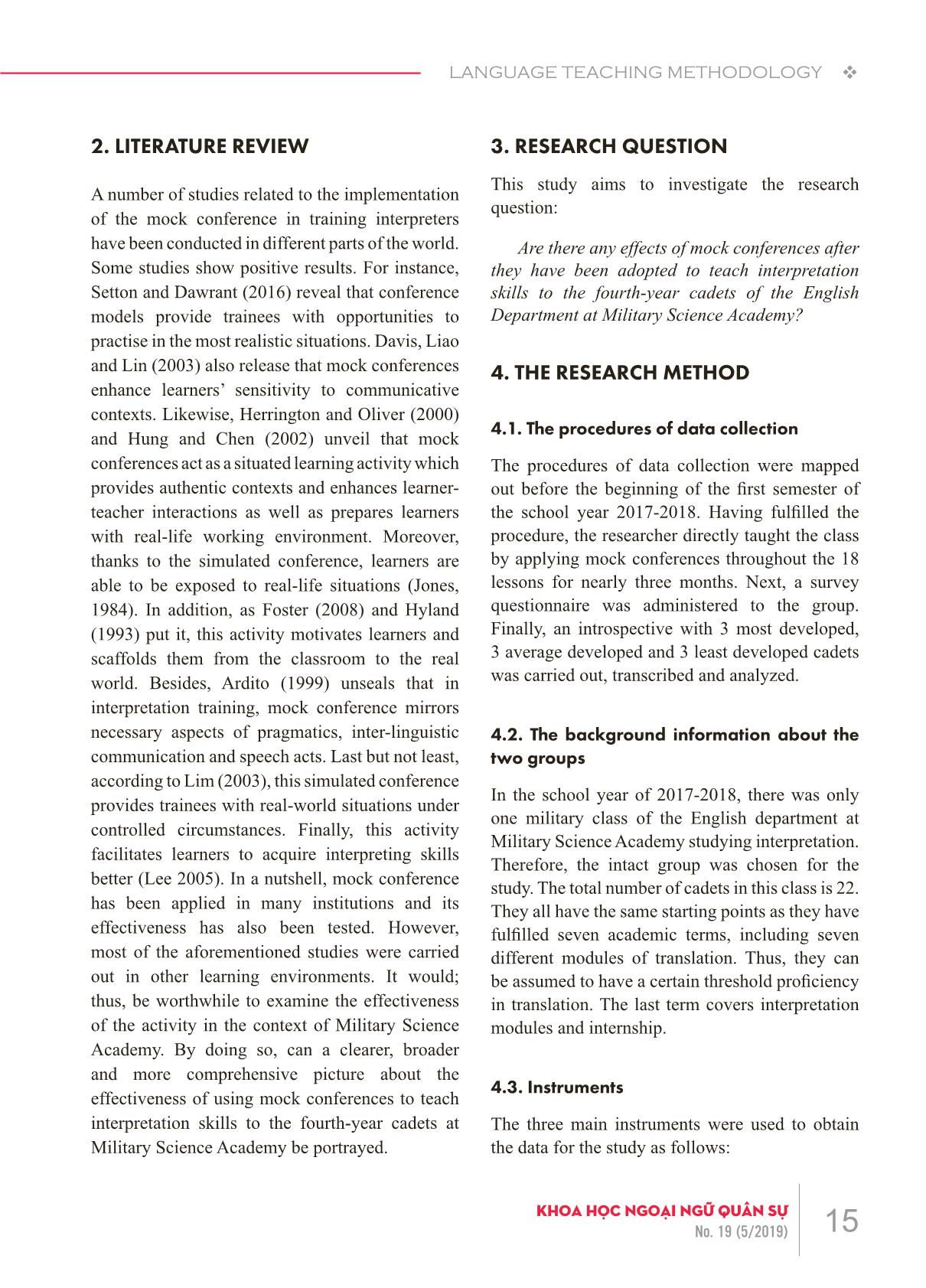
Trang 2
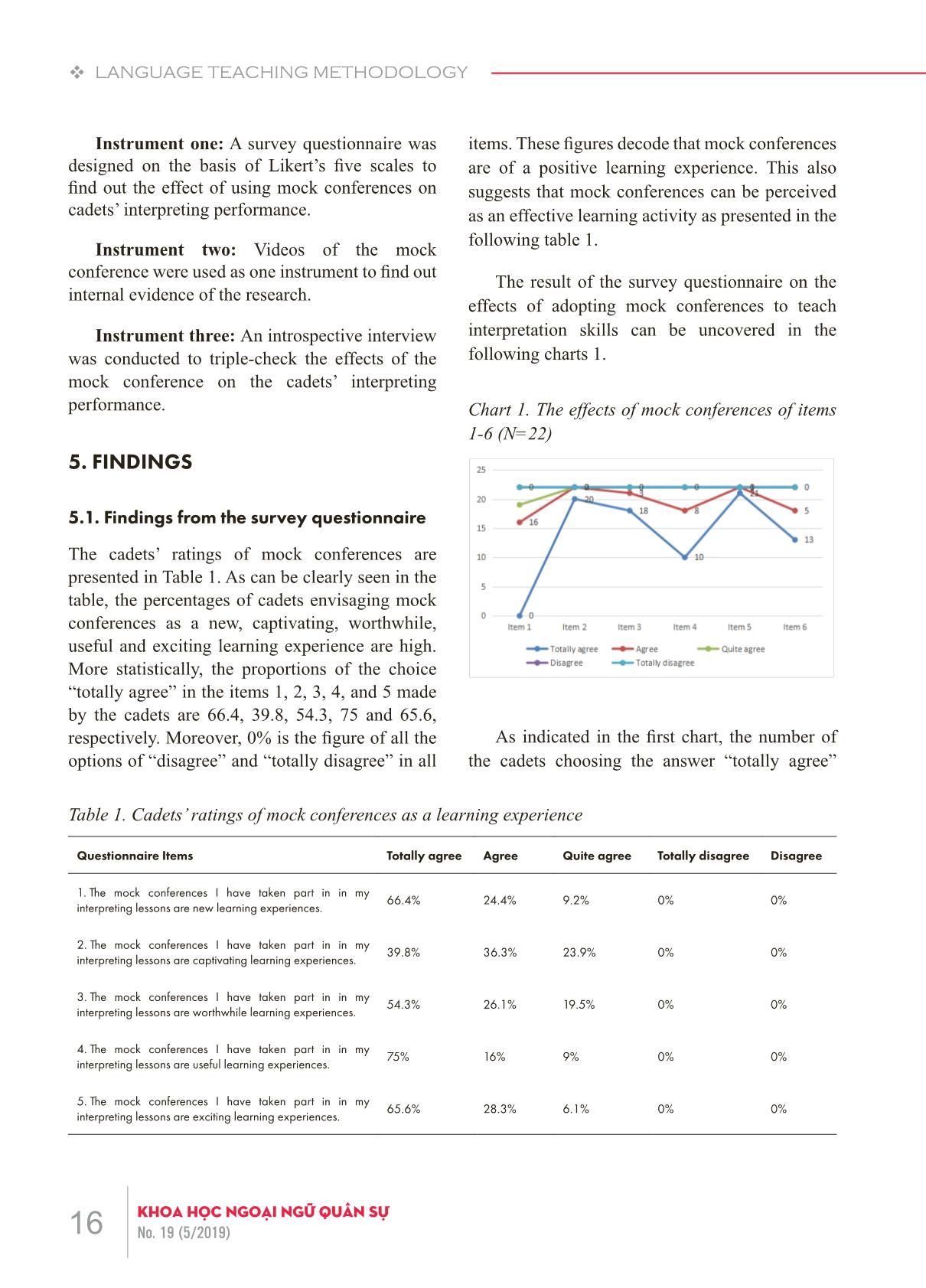
Trang 3
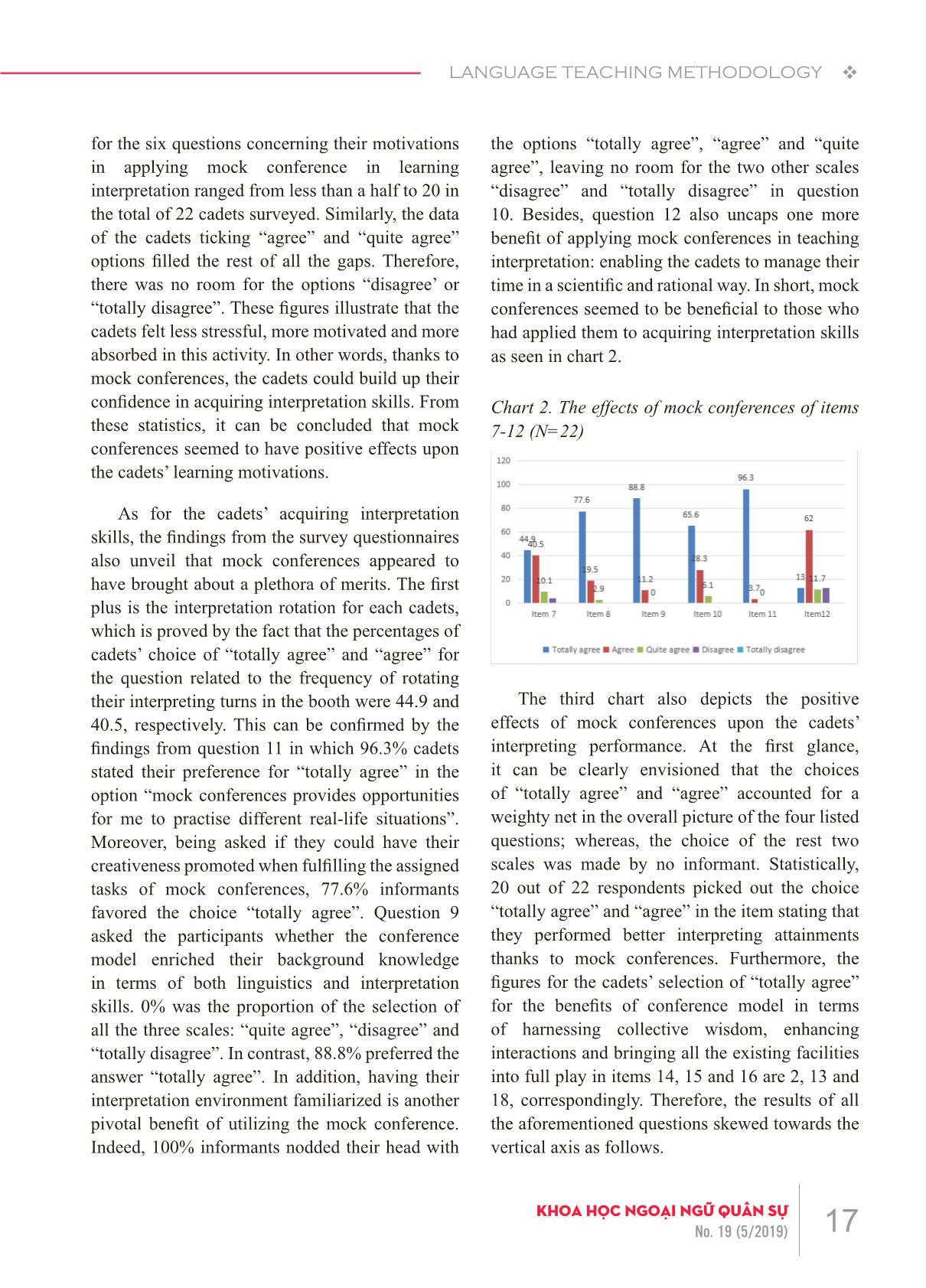
Trang 4
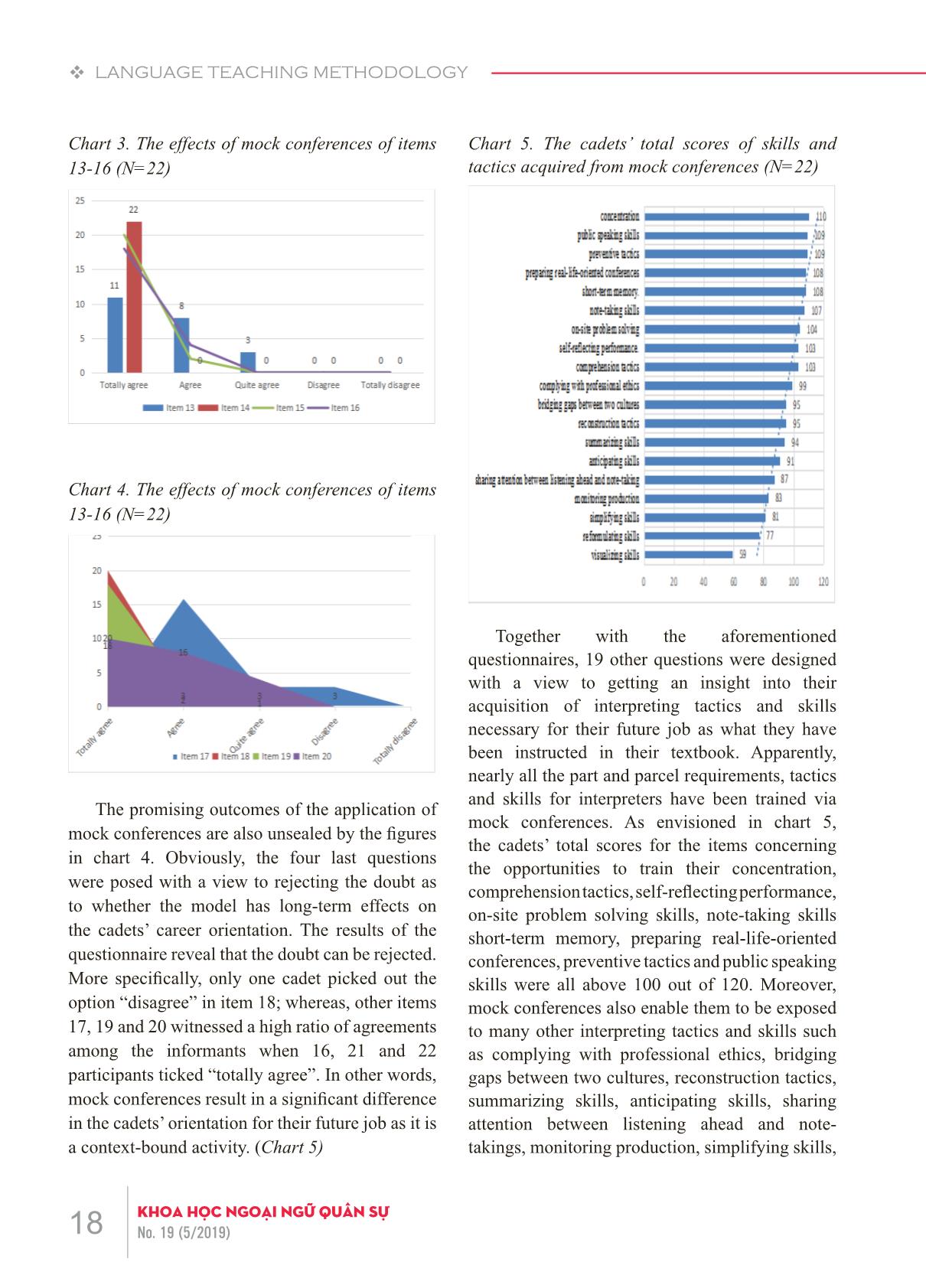
Trang 5
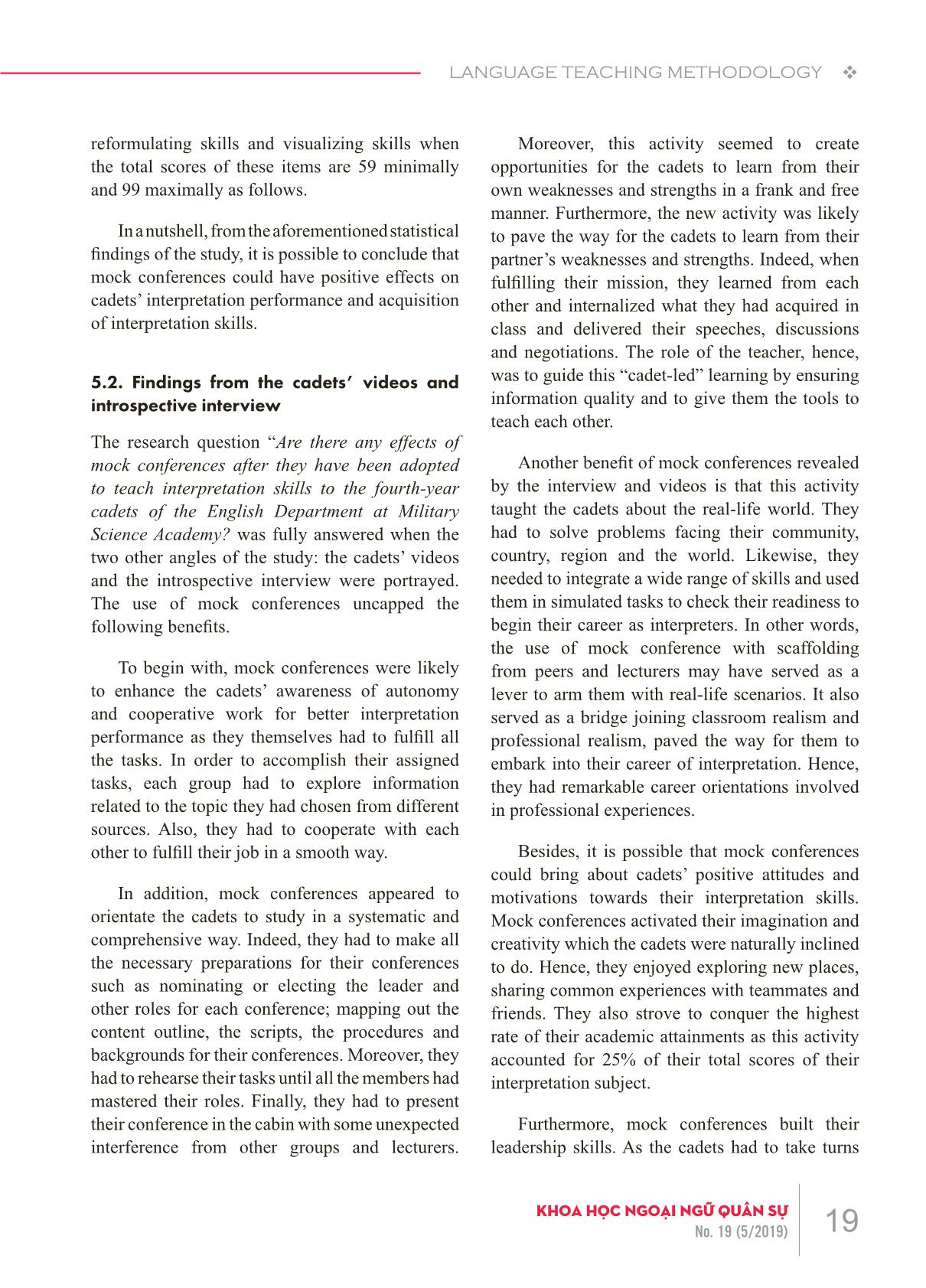
Trang 6
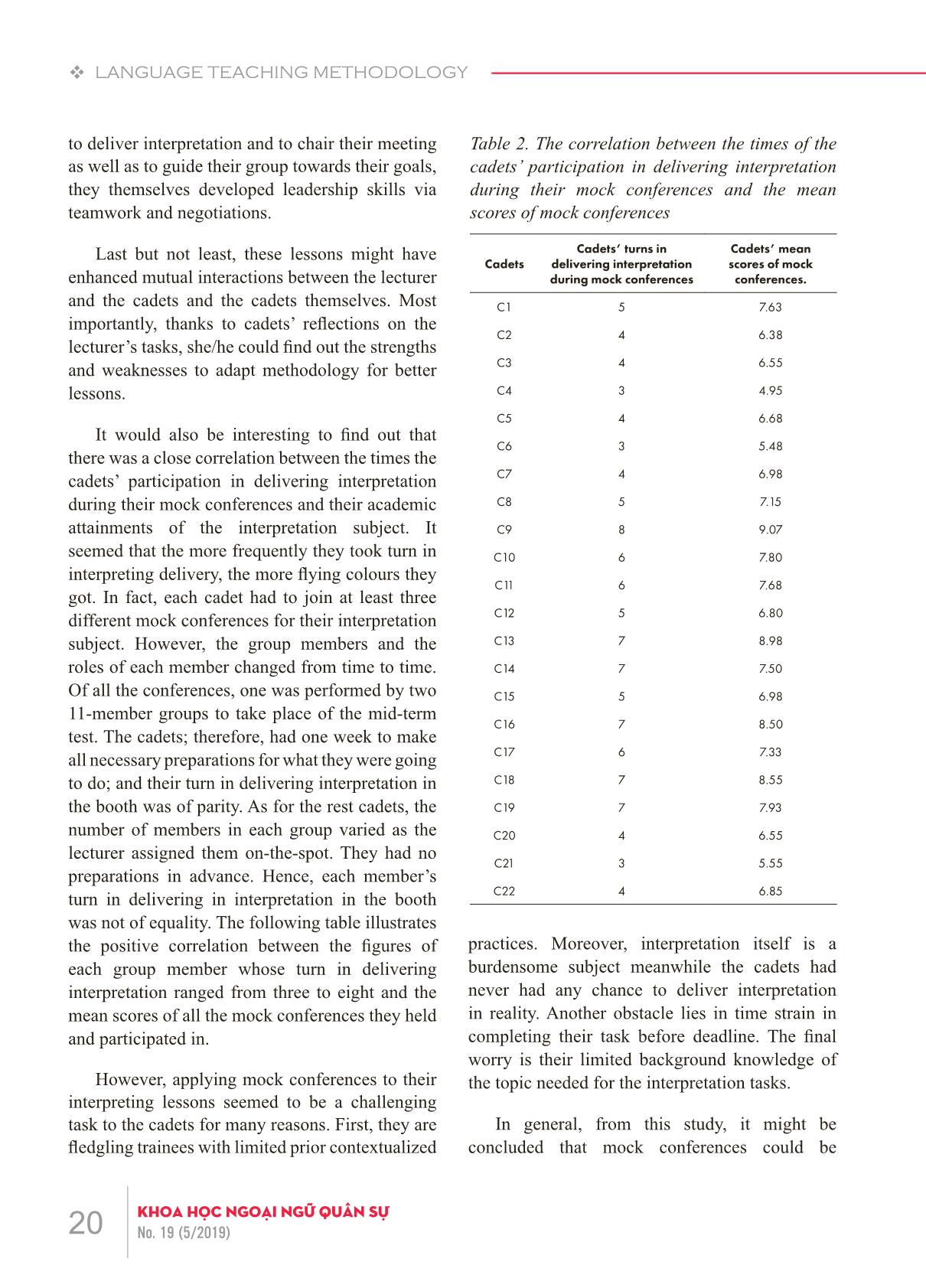
Trang 7
Tóm tắt nội dung tài liệu: The effects of using mock conferences to teach interpretation skills to the 4th year cadets of the English department at military science academy
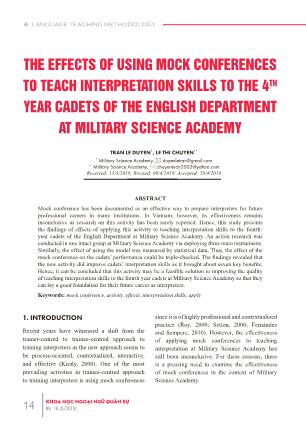
een in the table, the percentages of cadets envisaging mock conferences as a new, captivating, worthwhile, useful and exciting learning experience are high. More statistically, the proportions of the choice “totally agree” in the items 1, 2, 3, 4, and 5 made by the cadets are 66.4, 39.8, 54.3, 75 and 65.6, respectively. Moreover, 0% is the figure of all the options of “disagree” and “totally disagree” in all items. These figures decode that mock conferences are of a positive learning experience. This also suggests that mock conferences can be perceived as an effective learning activity as presented in the following table 1. The result of the survey questionnaire on the effects of adopting mock conferences to teach interpretation skills can be uncovered in the following charts 1. Chart 1. The effects of mock conferences of items 1-6 (N=22) As indicated in the first chart, the number of the cadets choosing the answer “totally agree” Table 1. Cadets’ ratings of mock conferences as a learning experience Questionnaire Items Totally agree Agree Quite agree Totally disagree Disagree 1. The mock conferences I have taken part in in my interpreting lessons are new learning experiences. 66.4% 24.4% 9.2% 0% 0% 2. The mock conferences I have taken part in in my interpreting lessons are captivating learning experiences. 39.8% 36.3% 23.9% 0% 0% 3. The mock conferences I have taken part in in my interpreting lessons are worthwhile learning experiences. 54.3% 26.1% 19.5% 0% 0% 4. The mock conferences I have taken part in in my interpreting lessons are useful learning experiences. 75% 16% 9% 0% 0% 5. The mock conferences I have taken part in in my interpreting lessons are exciting learning experiences. 65.6% 28.3% 6.1% 0% 0% 17KHOA HỌC NGOẠI NGỮ QUÂN SỰNo. 19 (5/2019) LANGUAGE TEACHING METHODOLOGY v for the six questions concerning their motivations in applying mock conference in learning interpretation ranged from less than a half to 20 in the total of 22 cadets surveyed. Similarly, the data of the cadets ticking “agree” and “quite agree” options filled the rest of all the gaps. Therefore, there was no room for the options “disagree’ or “totally disagree”. These figures illustrate that the cadets felt less stressful, more motivated and more absorbed in this activity. In other words, thanks to mock conferences, the cadets could build up their confidence in acquiring interpretation skills. From these statistics, it can be concluded that mock conferences seemed to have positive effects upon the cadets’ learning motivations. As for the cadets’ acquiring interpretation skills, the findings from the survey questionnaires also unveil that mock conferences appeared to have brought about a plethora of merits. The first plus is the interpretation rotation for each cadets, which is proved by the fact that the percentages of cadets’ choice of “totally agree” and “agree” for the question related to the frequency of rotating their interpreting turns in the booth were 44.9 and 40.5, respectively. This can be confirmed by the findings from question 11 in which 96.3% cadets stated their preference for “totally agree” in the option “mock conferences provides opportunities for me to practise different real-life situations”. Moreover, being asked if they could have their creativeness promoted when fulfilling the assigned tasks of mock conferences, 77.6% informants favored the choice “totally agree”. Question 9 asked the participants whether the conference model enriched their background knowledge in terms of both linguistics and interpretation skills. 0% was the proportion of the selection of all the three scales: “quite agree”, “disagree” and “totally disagree”. In contrast, 88.8% preferred the answer “totally agree”. In addition, having their interpretation environment familiarized is another pivotal benefit of utilizing the mock conference. Indeed, 100% informants nodded their head with the options “totally agree”, “agree” and “quite agree”, leaving no room for the two other scales “disagree” and “totally disagree” in question 10. Besides, question 12 also uncaps one more benefit of applying mock conferences in teaching interpretation: enabling the cadets to manage their time in a scientific and rational way. In short, mock conferences seemed to be beneficial to those who had applied them to acquiring interpretation skills as seen in chart 2. Chart 2. The effects of mock conferences of items 7-12 (N=22) The third chart also depicts the positive effects of mock conferences upon the cadets’ interpreting performance. At the first glance, it can be clearly envisioned that the choices of “totally agree” and “agree” accounted for a weighty net in the overall picture of the four listed questions; whereas, the choice of the rest two scales was made by no informant. Statistically, 20 out of 22 respondents picked out the choice “totally agree” and “agree” in the item stating that they performed better interpreting attainments thanks to mock conferences. Furthermore, the figures for the cadets’ selection of “totally agree” for the benefits of conference model in terms of harnessing collective wisdom, enhancing interactions and bringing all the existing facilities into full play in items 14, 15 and 16 are 2, 13 and 18, correspondingly. Therefore, the results of all the aforementioned questions skewed towards the vertical axis as follows. 18 KHOA HỌC NGOẠI NGỮ QUÂN SỰNo. 19 (5/2019) v LANGUAGE TEACHING METHODOLOGY Chart 3. The effects of mock conferences of items 13-16 (N=22) Chart 4. The effects of mock conferences of items 13-16 (N=22) The promising outcomes of the application of mock conferences are also unsealed by the figures in chart 4. Obviously, the four last questions were posed with a view to rejecting the doubt as to whether the model has long-term effects on the cadets’ career orientation. The results of the questionnaire reveal that the doubt can be rejected. More specifically, only one cadet picked out the option “disagree” in item 18; whereas, other items 17, 19 and 20 witnessed a high ratio of agreements among the informants when 16, 21 and 22 participants ticked “totally agree”. In other words, mock conferences result in a significant difference in the cadets’ orientation for their future job as it is a context-bound activity. (Chart 5) Together with the aforementioned questionnaires, 19 other questions were designed with a view to getting an insight into their acquisition of interpreting tactics and skills necessary for their future job as what they have been instructed in their textbook. Apparently, nearly all the part and parcel requirements, tactics and skills for interpreters have been trained via mock conferences. As envisioned in chart 5, the cadets’ total scores for the items concerning the opportunities to train their concentration, comprehension tactics, self-reflecting performance, on-site problem solving skills, note-taking skills short-term memory, preparing real-life-oriented conferences, preventive tactics and public speaking skills were all above 100 out of 120. Moreover, mock conferences also enable them to be exposed to many other interpreting tactics and skills such as complying with professional ethics, bridging gaps between two cultures, reconstruction tactics, summarizing skills, anticipating skills, sharing attention between listening ahead and note- takings, monitoring production, simplifying skills, Chart 5. The cadets’ total scores of skills and tactics acquired from mock conferences (N=22) 19KHOA HỌC NGOẠI NGỮ QUÂN SỰNo. 19 (5/2019) LANGUAGE TEACHING METHODOLOGY v reformulating skills and visualizing skills when the total scores of these items are 59 minimally and 99 maximally as follows. In a nutshell, from the aforementioned statistical findings of the study, it is possible to conclude that mock conferences could have positive effects on cadets’ interpretation performance and acquisition of interpretation skills. 5.2. Findings from the cadets’ videos and introspective interview The research question “Are there any effects of mock conferences after they have been adopted to teach interpretation skills to the fourth-year cadets of the English Department at Military Science Academy? was fully answered when the two other angles of the study: the cadets’ videos and the introspective interview were portrayed. The use of mock conferences uncapped the following benefits. To begin with, mock conferences were likely to enhance the cadets’ awareness of autonomy and cooperative work for better interpretation performance as they themselves had to fulfill all the tasks. In order to accomplish their assigned tasks, each group had to explore information related to the topic they had chosen from different sources. Also, they had to cooperate with each other to fulfill their job in a smooth way. In addition, mock conferences appeared to orientate the cadets to study in a systematic and comprehensive way. Indeed, they had to make all the necessary preparations for their conferences such as nominating or electing the leader and other roles for each conference; mapping out the content outline, the scripts, the procedures and backgrounds for their conferences. Moreover, they had to rehearse their tasks until all the members had mastered their roles. Finally, they had to present their conference in the cabin with some unexpected interference from other groups and lecturers. Moreover, this activity seemed to create opportunities for the cadets to learn from their own weaknesses and strengths in a frank and free manner. Furthermore, the new activity was likely to pave the way for the cadets to learn from their partner’s weaknesses and strengths. Indeed, when fulfilling their mission, they learned from each other and internalized what they had acquired in class and delivered their speeches, discussions and negotiations. The role of the teacher, hence, was to guide this “cadet-led” learning by ensuring information quality and to give them the tools to teach each other. Another benefit of mock conferences revealed by the interview and videos is that this activity taught the cadets about the real-life world. They had to solve problems facing their community, country, region and the world. Likewise, they needed to integrate a wide range of skills and used them in simulated tasks to check their readiness to begin their career as interpreters. In other words, the use of mock conference with scaffolding from peers and lecturers may have served as a lever to arm them with real-life scenarios. It also served as a bridge joining classroom realism and professional realism, paved the way for them to embark into their career of interpretation. Hence, they had remarkable career orientations involved in professional experiences. Besides, it is possible that mock conferences could bring about cadets’ positive attitudes and motivations towards their interpretation skills. Mock conferences activated their imagination and creativity which the cadets were naturally inclined to do. Hence, they enjoyed exploring new places, sharing common experiences with teammates and friends. They also strove to conquer the highest rate of their academic attainments as this activity accounted for 25% of their total scores of their interpretation subject. Furthermore, mock conferences built their leadership skills. As the cadets had to take turns 20 KHOA HỌC NGOẠI NGỮ QUÂN SỰNo. 19 (5/2019) v LANGUAGE TEACHING METHODOLOGY to deliver interpretation and to chair their meeting as well as to guide their group towards their goals, they themselves developed leadership skills via teamwork and negotiations. Last but not least, these lessons might have enhanced mutual interactions between the lecturer and the cadets and the cadets themselves. Most importantly, thanks to cadets’ reflections on the lecturer’s tasks, she/he could find out the strengths and weaknesses to adapt methodology for better lessons. It would also be interesting to find out that there was a close correlation between the times the cadets’ participation in delivering interpretation during their mock conferences and their academic attainments of the interpretation subject. It seemed that the more frequently they took turn in interpreting delivery, the more flying colours they got. In fact, each cadet had to join at least three different mock conferences for their interpretation subject. However, the group members and the roles of each member changed from time to time. Of all the conferences, one was performed by two 11-member groups to take place of the mid-term test. The cadets; therefore, had one week to make all necessary preparations for what they were going to do; and their turn in delivering interpretation in the booth was of parity. As for the rest cadets, the number of members in each group varied as the lecturer assigned them on-the-spot. They had no preparations in advance. Hence, each member’s turn in delivering in interpretation in the booth was not of equality. The following table illustrates the positive correlation between the figures of each group member whose turn in delivering interpretation ranged from three to eight and the mean scores of all the mock conferences they held and participated in. However, applying mock conferences to their interpreting lessons seemed to be a challenging task to the cadets for many reasons. First, they are fledgling trainees with limited prior contextualized practices. Moreover, interpretation itself is a burdensome subject meanwhile the cadets had never had any chance to deliver interpretation in reality. Another obstacle lies in time strain in completing their task before deadline. The final worry is their limited background knowledge of the topic needed for the interpretation tasks. In general, from this study, it might be concluded that mock conferences could be Table 2. The correlation between the times of the cadets’ participation in delivering interpretation during their mock conferences and the mean scores of mock conferences Cadets Cadets’ turns in delivering interpretation during mock conferences Cadets’ mean scores of mock conferences. C1 5 7.63 C2 4 6.38 C3 4 6.55 C4 3 4.95 C5 4 6.68 C6 3 5.48 C7 4 6.98 C8 5 7.15 C9 8 9.07 C10 6 7.80 C11 6 7.68 C12 5 6.80 C13 7 8.98 C14 7 7.50 C15 5 6.98 C16 7 8.50 C17 6 7.33 C18 7 8.55 C19 7 7.93 C20 4 6.55 C21 3 5.55 C22 4 6.85
File đính kèm:
 the_effects_of_using_mock_conferences_to_teach_interpretatio.pdf
the_effects_of_using_mock_conferences_to_teach_interpretatio.pdf

